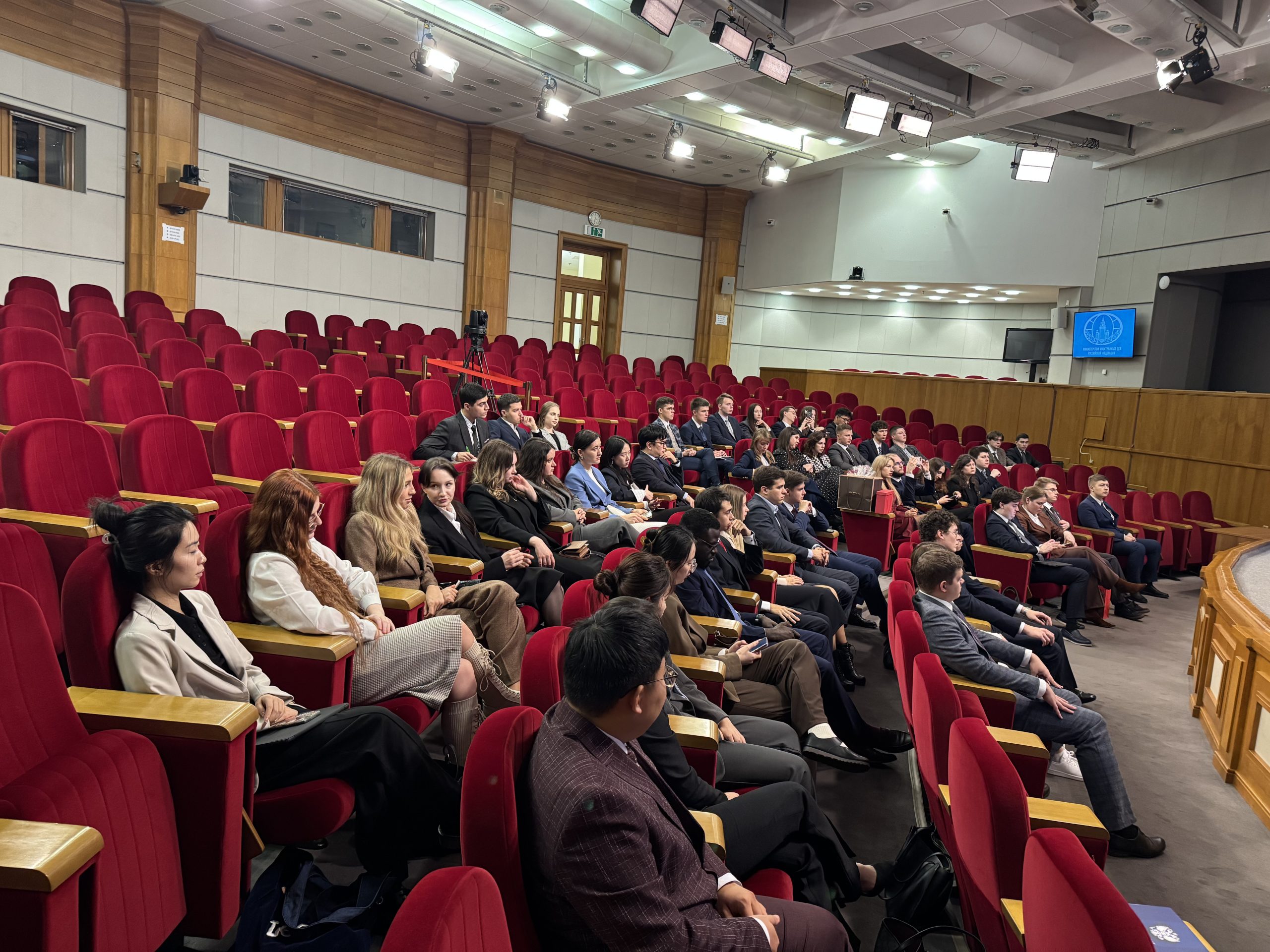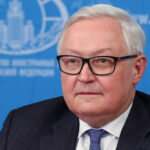Hot Topic
Sergey Ryabkov
STATEMENT AT A MEETING WITH STUDENTS OF THE “INTERNATIONAL SECURITY” MASTER’S PROGRAM AND GRADUATES OF THE DUAL DEGREE INTERNATIONAL MASTER’S PROGRAM “GLOBAL SECURITY, NUCLEAR POLICY, AND WMD NONPROLIFERATION”
(Moscow, October 24, 2025)
Dear Dr. Orlov,
Dear Colleagues,
I am very pleased to have the opportunity to meet with everyone here, and of course, I am happy to welcome you to the Ministry of Foreign Affairs of Russia. Today, we will have the opportunity to discuss current issues in Russian nonproliferation, strategic stability, and international security policy. As was mentioned, I am certainly open to discussion and ready to listen to your views on these topics.
Nuclear nonproliferation is among our foreign policy priorities. On this matter, Russia consistently relies on the existing international legal framework, which, as I am sure everyone here understands, is centered around the Treaty on the Nonproliferation of Nuclear Weapons (NPT). The Treaty continues to play a crucial role in maintaining international peace and security. It’s over fifty years of successful operation, clearly demonstrating the NPT’s relevance for all States Parties and serving as evidence of its usefulness.
In April-May next year, the 11th NPT Review Conference is scheduled to take place, marking the end of the current review cycle. The two previous cycles concluded without the adoption of final documents. The three sessions of the Preparatory Committee in this cycle have shown that we have not made much progress toward a final agreement either. This is partly due to longstanding disagreements between advocates of rapid nuclear disarmament at any cost and the nuclear-weapon states. Additionally, there are conflicts between those who defend national sovereignty and those willing to compromise it to meet excessive demands for nuclear verification. We also observe the persistent efforts of some countries to use the Treaty for purposes unrelated to nuclear nonproliferation, such as exerting political pressure on opponents or asserting political dominance.
The Russian delegation at the upcoming conference will do everything to ensure that contradictions among NPT participants do not weaken its foundations. We plan to work on potential solutions. Still, a compromise in this situation is only possible in an environment of mutual respect and consideration for the interests of all states. We start from the premise that if a final document can be agreed upon, it will reflect the lowest common denominator, considering the positions of all review process participants. Given the increasing contradictions among NPT States Parties, we see the main goal of the conference as avoiding harm to the treaty’s integrity. The ultimate goal is to move toward consensus solutions in nuclear nonproliferation. Deviating from the consensus principle would mean ending the review process and severely harming the NPT’s integrity.
Dear Colleagues,
In recent years, review process events have focused mainly on nuclear disarmament. We support the full implementation of integrated measures aimed at reaching the ultimate goal of disarmament – creating a nuclear-free and safer world for everyone. The provisions of the NPT clearly state that efforts in this area are closely connected to the broader goal of comprehensive disarmament. Calls for rapid nuclear disarmament without taking into account the actual military-political situation and the security interests of nuclear-weapon states are entirely unrealistic.
In the strategic arena, numerous significant problems have emerged, mainly related to the highly destabilizing doctrines and military-technical programs of Western countries, designed to achieve military dominance. Among the most negative factors, we specifically highlight the hostile policies of NATO nations, which could lead to a direct conflict between nuclear powers; the development by this self-described “nuclear alliance” of schemes and methods for “nuclear sharing,” including expanding the scope of US “nuclear presence” in Europe and the range of countries authorized to receive US special munitions for targets; the creation of a global, multi-domain US missile defense system and the associated missile shields of other Western nations; the West’s enhancement of high-precision, long-range capabilities for so-called “preemptive” disarming strikes, including the forward deployment of ground-launched intermediate-range and shorter-range missiles; and the US along with some allies planning to deploy weapons in space, turning it into a warfare domain. This list is far from complete.
All of this not only hinders productive dialogue on nuclear disarmament and arms control but also compels other states, including Russia, to take counteractive military-technical measures. The latest example is our withdrawal from the moratorium on deploying ground-launched intermediate-range and shorter-range missiles, given the plans and actions to deploy similar American and other Western-made weapons in Europe and the Asia-Pacific region.
Nevertheless, we remain open to political and diplomatic solutions in the future. On September 22 of this year, the President of the Russian Federation put forward a constructive initiative to preserve the status quo established by the New START Treaty regarding the strategic offensive arms of Russia and the United States. It is planned that after the Treaty expires in February 2026, both sides could continue to adhere to its core quantitative limits for at least one year. This step aims to prevent a strategic arms race, maintain a predictable and restrained environment in this sphere, and promote the goals of the NPT.
The success of the Russian initiative depends solely on reciprocal actions from the American side, which must avoid measures that weaken the current balance of deterrence capabilities. We also need to verify whether Washington truly rejects the highly hostile anti-Russian stance of the previous US administration and whether it is prepared to address the root causes of the current crisis between Russia and the West, including the core security contradictions.
An undesirable outcome of Russia’s proposed step would be a complete void in restrictions on nuclear arsenals, increased tension, and a rising nuclear threat. However, we will undoubtedly manage such a scenario if it occurs; our security remains assured regardless.
Dear Colleagues,
The fulfillment of nonproliferation commitments by NPT States Parties is essential for international peace and security. The key element for verifying compliance is the IAEA safeguards system. Russia advocates for the preservation and enhancement of the Agency’s verification mechanism. We consistently emphasize that it should remain objective, depoliticized, technically sound, understandable to states, and not exceed the legal obligations of countries and the IAEA Secretariat under the safeguards agreements.
A blatant case of abusing the NPT nonproliferation mechanism to justify military aggression was the missile and bomb strikes carried out in June this year by Israel and the United States on nuclear facilities in Iran under IAEA safeguards. This state was actively cooperating with the Agency, subject to its most intensive inspections, and faithfully fulfilling its NPT obligations. The American-Israeli attacks caused severe damage to the IAEA’s verification activities in the Islamic Republic of Iran and exposed the Agency’s inspectors there to mortal risk.
We have challenged the actions of the UN Secretariat. We do not recognize the “snapback” as coming into force, and we insist that the actions of the West constitute a violation of international law and cannot serve as a basis for anti-Iranian sanctions through the UN Security Council.
Western countries need to abandon their selfish ambitions and finally focus their energy not on destruction but on actively seeking negotiated solutions. A settlement on the Iranian nuclear program, as well as resolving other crises in the Middle East, can only be achieved through diplomatic negotiations. There is no reasonable alternative to this.
Dear Colleagues,
In summary, when developing policy on nonproliferation of nuclear weapons, our country supports a balanced approach. This approach, of course, considers the views of all members of the international community. Such a strategy does not necessarily entail unconditional agreement with others’ opinions; however, Russia continues to operate on the belief that the ability to listen to – and, most importantly, to truly hear – one’s opponents is the minimum requirement for finding solutions on international platforms.
Thank you for your attention!
Translated from Russian by Mr. Ilya Subbotin, PIR Center Intern.
Keywords: Strategic Stability; Arms Control; Nuclear Nonproliferation
NPT
E16/SHAH – 25/10/27



